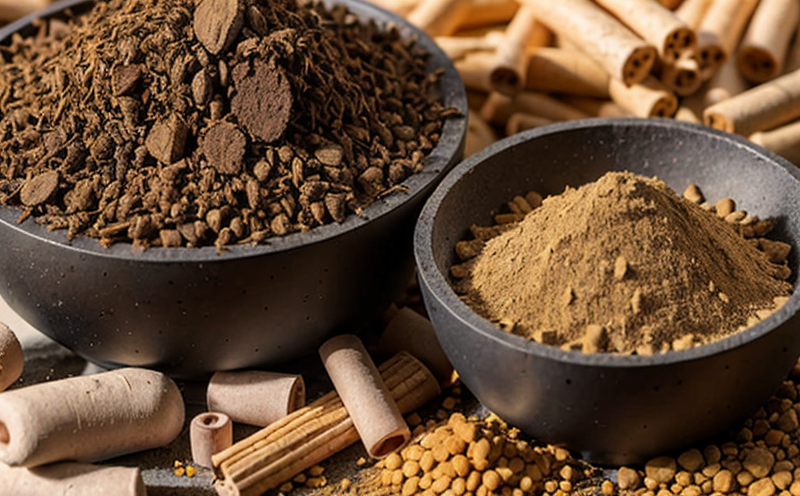ISO 18125 Determination of Calorific Value in Biofuels
The ISO 18125 standard is a critical tool for ensuring the quality and reliability of biofuel products across various sectors including renewable energy, transportation, and environmental sustainability. This method provides a standardized approach to determining calorific value (CV), which is essential for optimizing combustion processes, enhancing fuel efficiency, and meeting regulatory standards.
The determination of calorific value involves measuring the heat released during the complete combustion of biomass or bioenergy resources under controlled conditions. The process can be conducted in a bomb calorimeter where oxygen is introduced to the sample, leading to its complete combustion at a known temperature and pressure. The subsequent rise in temperature is measured accurately using thermocouples, and this data is used to calculate the calorific value.
For quality managers and compliance officers, understanding the nuances of ISO 18125 can help ensure that biofuel products meet international standards and are reliable for industrial applications. In R&D environments, accurate calorific value determination is crucial for optimizing fuel blends, improving combustion efficiency, and reducing emissions. Procurement teams benefit from this standard as they can verify the quality of incoming biomass feedstocks.
The importance of ISO 18125 extends beyond laboratory settings into real-world applications such as power generation facilities, transportation fleets, and industrial processes that rely on biofuels for energy production. Accurate calorific value measurements are pivotal in these sectors to ensure consistent performance and reliability.
In summary, the determination of calorific value through ISO 18125 is a cornerstone of quality assurance in the renewable energy sector, particularly for biomass and bioenergy resources. It provides a standardized method that ensures consistency, accuracy, and compliance with international standards, thereby enhancing the overall performance and reliability of biofuel products.
Applied Standards
The ISO 18125 standard is part of a broader suite of standards aimed at ensuring the quality and reliability of biofuels. This includes ISO 17946, which deals with sampling methods for solid biomass fuels, and ISO 18301, which covers the determination of ash content in biomass materials.
- ISO 18125: Determination of calorific value by means of a bomb calorimeter
- ISO 17946: Sampling of solid biomass fuels
- ISO 18301: Determination of ash content in biomass materials
The combination of these standards ensures a comprehensive approach to the quality assurance and reliability assessment of biofuels. ISO 18125 specifically focuses on calorific value, which is crucial for optimizing combustion processes and ensuring consistent performance across various applications.
Scope and Methodology
The scope of ISO 18125 encompasses the determination of calorific value by means of a bomb calorimeter. This method is applicable to solid, liquid, or gaseous biofuels used in various industrial processes, including power generation, transportation, and heating.
The methodology involves several key steps:
- Sample Preparation: The sample should be representative of the batch or lot being tested. For solid samples, this may involve crushing and sieving to ensure uniformity. Liquid samples are typically diluted if necessary, while gaseous samples are collected under controlled conditions.
- Sampling: Samples must be taken in accordance with ISO 17946 to ensure representativeness. The sample size depends on the expected variability and batch size.
- Combustion: The prepared sample is placed in a bomb calorimeter, which is then filled with oxygen gas under controlled pressure. The combustion process is initiated by an ignition source.
- Data Collection: Thermocouples measure the temperature rise during combustion, and this data is used to calculate the calorific value using the formula provided in ISO 18125.
The accuracy of the results depends heavily on the quality of sample preparation, the precision of the bomb calorimeter, and the repeatability of the combustion process. Compliance with international standards ensures that these factors are consistently managed, leading to reliable and reproducible results.
Quality and Reliability Assurance
The quality and reliability of biofuel products are paramount in ensuring their successful integration into industrial processes. ISO 18125 plays a crucial role in maintaining these standards by providing a robust method for determining calorific value.
- Precision: The precision of the results is critical, especially when comparing different batches or lots of biofuel. Reproducibility tests should be conducted regularly to ensure that the equipment and operators are performing consistently.
- Accuracy: The accuracy of the calorific value determination directly impacts combustion efficiency and fuel consumption. Regular calibration of the bomb calorimeter is essential to maintain accuracy.
- Durability: Long-term reliability is ensured by routine maintenance and calibration checks, ensuring that the equipment remains in optimal working condition over extended periods.
Biofuel suppliers can benefit from regular audits and certification processes based on ISO 18125 to maintain their competitive edge. By adhering to these standards, they ensure that their products meet or exceed international benchmarks, thereby gaining trust among customers and regulatory bodies.





